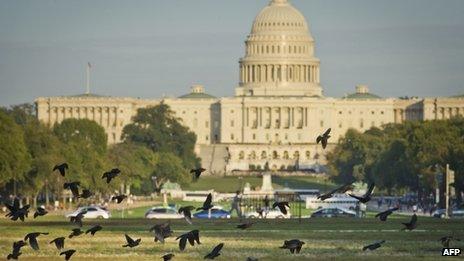China media criticise US debt crisis
- Published

Washington must agree a deal to raise its borrowing limit by 17 October
As US lawmakers struggle to reach a deal on the debt-ceiling crisis, Chinese media have been speaking out about the impact abroad.
China is the US's largest creditor, and a US default would lower the value of US bonds, including the $1.28tn in Treasury bonds held by Beijing.
Chinese Vice Finance Minister Zhu Guangyao on Tuesday urged the US to take "concrete steps" to resolve the issue.
"In the long run, the United States must address the fiscal stalemate, must raise the cap of the debt limit soon as to keep the promise of no default of its Treasury bonds and keep the sound momentum of the US economy and avoid dragging down the world economy," he said.
State-run news agency Xinhua , externalcaused a stir on Sunday when it published an English-language commentary calling for "a de-Americanised world".
It called for "the introduction of a new international reserve currency" to replace the US dollar, "so that the international community could permanently stay away from the spillover of the intensifying domestic political turmoil in the United States".
Developing and emerging economies should have a greater say in financial institutions such as the IMF and World Bank, it added.
The commentary has been re-quoted in Chinese-language press, external, some , externalof whom have published media round-ups of the response from US media.
An opinion piece in Wednesday's US edition of state-run China Daily, external criticised the US's "love affair with debts", and praised the "Chinese government's policy of carefully managing budget deficits".
It also warned that the debt crisis increased "the potential risk of China holding $1.277 trillion in US Treasuries".
The government should "support Chinese enterprises to invest abroad in a more diversified manner so as to improve China's external portfolio," it said.
'US decline'
Zhang Bin from the Chinese Academy of Social Sciences told Communist Party mouthpiece People's Daily, external that the probability of the US defaulting on its debts was not high, because "the impact of a default on domestic and global markets would be too great".
The paper adds: "From an international perspective, if Congress does not raise its debt ceiling in time, it will lead to tensions with China, Japan and other creditors."
People's Daily had criticised Washington earlier this month, saying that US "arrogance" had let it "use its domestic policy to kidnap the global economy".
On Friday, pro-Beijing Hong Kong newspaper Wen Wei Po, external predicted that such crises would become more frequent in the future, and said it was a sign of the US's decline.
"This indicates that... the world's dominant empire, the US, is already following the footsteps of the 19th century British Empire," it said.
The US shutdown and default risk reflected that "US capitalist society would not only face innate periodic financial crises, but would also face periodic political crises," it added.